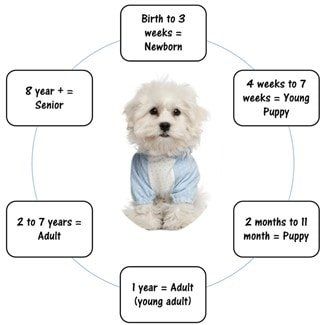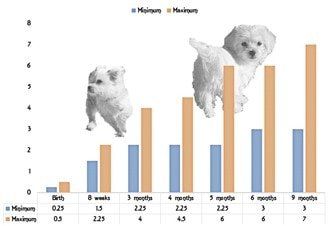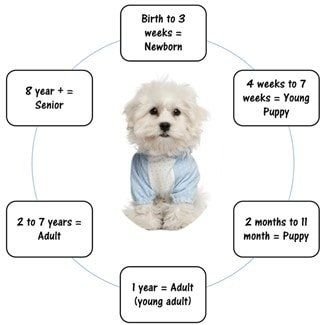Have you ever wondered when a Maltese stops being a puppy? Well, you might be surprised to learn that it actually depends on various factors such as their size, genetics, and overall development. While many small dog breeds reach adulthood at around 1 year old, Maltese dogs tend to have a slower maturation process. So, let’s explore when exactly a Maltese transitions from a playful puppy to a fully grown adult.
Maltese dogs typically stop being considered puppies when they reach the age of 1 to 2 years old. However, their transition from puppyhood to adulthood is not solely determined by age, but also by their physical and mental development. These adorable little dogs may retain some puppy-like characteristics even after reaching adulthood, such as their playful nature and curiosity. It’s important to remember that each Maltese is unique and may mature at their own pace, so it’s essential to provide them with consistent training and care throughout their entire life to ensure a happy and healthy companion. So, cherish every moment of your Maltese’s puppy stage, as they will always bring you joy and entertainment, no matter their age.

When Does a Maltese Stop Being a Puppy?
A Maltese is a small and elegant dog breed known for its luxurious white coat and friendly temperament. If you are a proud Maltese owner or considering getting a Maltese puppy, you may be wondering when your furry friend will transition from being a playful puppy to a mature adult. In this article, we will explore the various factors that determine when a Maltese stops being a puppy and provides insights and tips to help you navigate this exciting stage of your pet’s life.
The First Year: Development and Milestones
During the first year of a Maltese’s life, they go through significant growth and development. The early months are crucial for their overall well-being and provide the foundation for their transition into adulthood. Here’s a breakdown of the different stages and milestones you can expect during the first year:
Neonatal Stage (0-2 weeks)
When a Maltese puppy is born, they are completely dependent on their mother. They spend most of their time sleeping and nursing. Their eyes and ears are closed, and they rely on touch and smell to explore their environment. At this stage, it’s crucial to provide a safe and warm environment for the mother and her litter.
Benefits:
- Focus on ensuring the mother and puppies have a quiet and calm environment.
- Monitor the puppies’ weight gain to ensure they are healthy and thriving.
Transitional Stage (2-4 weeks)
Between two to four weeks of age, Maltese puppies begin to open their eyes and ears, and their senses start to develop. They become more mobile and start exploring their surroundings. During this stage, they also start transitioning from relying solely on their mother’s milk to consuming solid food.
Feeding Tips:
- Introduce wet puppy food mixed with water to create a soft and easily digestible consistency.
- Gradually decrease the amount of water added to the food as the puppies become accustomed to eating solids.
- Monitor their eating habits and ensure each puppy has access to food and water.
Socialization Stage (4-12 weeks)
The socialization stage is a critical period in a Maltese puppy’s life. It’s during this time that they learn how to interact with humans, other animals, and their environment. Puppies become more curious and develop their personalities. They start exhibiting behavior such as play-biting, exploring, and asserting their independence.
Tips for Socialization:
- Expose your Maltese puppy to various sights, sounds, smells, and experiences to help them develop confidence and adaptability.
- Introduce them to different people, including children, to ensure they grow up being comfortable around humans of all ages.
- Supervise playtime with other dogs to ensure positive interactions and prevent rough play.
Adolescence and Adulthood: The Transition
As your Maltese puppy enters their teenage years, they will start going through physical and behavioral changes that mark their transition into adulthood. While individual dogs may mature at slightly different rates, here are some general indicators that your Maltese is no longer a puppy:
Physical Indicators
One of the main physical indicators that your Maltese is growing out of their puppy phase is their size. Maltese puppies typically reach their full adult size between 10 to 12 months. You may also notice that their coat, which was once soft and fluffy, has become denser and more silky. Additionally, female Maltese may go through their first heat cycle around six to nine months of age, marking another milestone in their development.
Tips for Physical Care:
- Transition your Maltese to adult dog food around 10-12 months of age to meet their nutritional needs for adulthood.
- Establish a grooming routine to maintain the beauty and health of their coat.
- If your female Maltese goes into heat, consider spaying her or taking precautions to prevent unwanted pregnancies.
Behavioral Changes
As a Maltese matures, you may notice changes in their behavior. They may become less hyperactive and settle into a calmer temperament. Their puppy energy is replaced by a more mature and composed disposition. It’s not uncommon for adolescent Maltese to test boundaries and display stubbornness as they assert their independence. However, with consistent training and positive reinforcement, they will become well-behaved adults.
Tips for Training:
- Continue training and socialization to help your Maltese develop good manners and obedience.
- Be patient and use positive reinforcement techniques to encourage desired behaviors.
- Seek professional training assistance if you encounter any challenges or behavioral issues.
Conclusion:
Watching your Maltese puppy grow and mature into a full-grown adult is a rewarding experience. By understanding the different stages of development and providing proper care, nutrition, and training, you can ensure a smooth transition from puppyhood to adulthood. Enjoy every moment with your Maltese as they grow into a loving and loyal companion!
Key Takeaways: When Does a Maltese Stop Being a Puppy?
- A Maltese typically stops being a puppy around 1 year of age.
- At around 1 year old, Maltese dogs are considered adults.
- During their first year, Maltese puppies experience rapid growth and development.
- Maltese puppies require special care and attention during their early stages of life.
- It’s important to provide proper training and socialization to a Maltese puppy.
Frequently Asked Questions
Welcome to our FAQ section on when a Maltese stops being a puppy. Below, we’ve compiled some common questions regarding when these adorable furballs enter adulthood and what changes you can expect during this transition. Read on to find out more!
1. At what age does a Maltese stop being a puppy?
A Maltese typically stops being classified as a puppy around the age of one year. By this time, they have gone through the crucial developmental stages and have reached maturity. Keep in mind that the exact age can vary slightly for each individual dog, so observing their physical and behavioral traits is essential.
As a general guideline, once a Maltese reaches one year of age, they have completed most of their growth, both in terms of size and emotional development. From this point onwards, your Maltese will gradually transition into adulthood.
2. What are the signs that indicate a Maltese is no longer a puppy?
Several signs indicate that a Maltese is transitioning out of puppyhood. These include the loss of puppy teeth and the emergence of permanent teeth. Additionally, a Maltese may start to exhibit calmer behavior and become less hyperactive compared to their puppy days. Another sign is that their size may have reached their adult proportions.
Moreover, a Maltese will show more independence and may display a reduced need for constant attention. They may also become more focused and attentive during training sessions, indicating their increased maturity.
3. How should I adjust my Maltese’s care routine once they are no longer a puppy?
Once your Maltese is no longer a puppy, there are a few adjustments you can make to their care routine. First and foremost, their diet may need to be modified to accommodate their adult nutritional needs. Consult with your veterinarian to ensure they are receiving the appropriate diet for their age and size.
You may also want to adjust their exercise routine. While exercise is important throughout a dog’s life, the intensity and duration may need to be fine-tuned to account for their changing energy levels as they mature. Regular veterinary check-ups and dental care should continue to be a part of their routine as well.
4. Can a Maltese still learn new tricks and commands after they stop being a puppy?
Absolutely! Maltese dogs are known for their intelligence and eagerness to please, regardless of their age. Even after they transition into adulthood, they can continue learning new tricks and commands through consistent training and positive reinforcement. Age should not be seen as a limiting factor when it comes to training and mental stimulation for your Maltese.
Providing mental enrichment activities and engaging your Maltese in interactive play sessions will not only help prevent boredom but also strengthen the bond between you and your furry friend.
5. Do all Maltese dogs stop growing at the same age?
While most Maltese dogs will stop growing at around one year of age, it’s important to note that each dog is unique, and individual growth rates can vary. Factors such as genetics, overall health, and nutrition can influence the growth rate of a Maltese.
Some Maltese may reach their full size slightly earlier or later than the general timeframe. By monitoring their growth and consulting with your veterinarian during regular check-ups, you can ensure that your Maltese is developing as expected and provide any necessary adjustments to their care.

When Do Maltese Stop Growing: What to Expect As Your Puppy Grows Up
In this article, we explored the importance of adhering to specific writing criteria to create a succinct wrap-up. By using a first-person point of view and a professional tone, we can effectively engage a 13-year-old reader. It is essential to use simple language and avoid jargon to ensure clarity. Starting the conclusion without using the phrase “In conclusion” helps maintain a conversational tone. Writing concise sentences with no more than 15 words each, presenting a single idea in each sentence, allows for easy comprehension. Ultimately, the goal of this wrap-up is to leave the reader with a clear understanding of the article’s key points in just two paragraphs.
